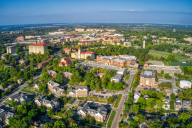You have /5 articles left.
Sign up for a free account or log in.
The COVID-19 pandemic has taken its toll across the global landscape, including in American higher education. Colleges and universities have done their best to leap into the fall semester, often hoping against all odds to permit face-to-face instruction. With many now backing away from in-person learning and students wary of paying high tuition for online instruction, a number of institutions that were already under economic pressure are now headed toward financial distress.
There are plenty of good reasons to worry about these existential threats looming across the American higher education system. One of the great things about that system has been the variety of opportunities it offers: competition between institutions arguably gives students more options to find a good fit and strengthens the educational experience as a whole. Historically, postsecondary education has provided something of a safety net during recessions, a safe harbor where people can acquire in-demand skills when the labor market is weak.
But valid concerns about the future of higher education extend well beyond just the economic ones. Colleges and universities provide many nonmonetary benefits that are central to American democracy. Chief among these -- and particularly salient in this election year -- is their role in mitigating authoritarian preferences and attitudes, a relationship that my colleagues and I explore in a recently released report. Among our findings: authoritarian preferences and attitudes are weaker among people with higher levels of educational attainment -- particularly those with a bachelor’s degree or higher, and especially if they have training in the liberal arts.
Authoritarianism is a preference for uniformity that many people hold to some degree. It’s an inclination to prefer the security of sameness over the uncertainty of difference. Even people who value pluralism and diversity may be more susceptible to authoritarianism than they would like to think, especially when it seems to offer protection against threats to their lives, livelihoods or cultural values. In the face of these perceived threats, even those who typically are not so inclined can be willing to suppress the rights of others to protect their own sense of dominance or personal safety.
That’s one reason why authoritarianism has gained power in recent years. In reaction to the perceived threats of globalization, immigration and demographic change, voters around the world have turned to authoritarian leaders at the polls. The modern world has made it impossible to avoid diversity. But those with strong authoritarian preferences are nonetheless willing to try, even at the cost of suppressing others’ rights.
Postsecondary education protects against authoritarianism because it weakens the threats that trigger authoritarian reactions or reveals that those threats aren’t as menacing as they might seem. Higher levels of education are associated with higher socioeconomic status, in part because of the well-documented college earnings premium, potentially reducing the economic instability that an individual might experience due to global competition for jobs. During the pandemic, people with bachelor’s degrees or higher have been more likely to be able to work from home, buffering them from the job losses that have ravaged workers with less formal education.
Higher education is also associated with greater civic engagement, and the people who show higher levels of political interest and democratic activism are less authoritarian. Perhaps most important, higher education typically exposes students to people with diverse ideas and backgrounds, in many cases increasing their comfort with difference.
In particular, education in the liberal arts involves consideration of what it means to be human. Study of such subjects as art, history, literature, philosophy and ethnic studies -- disciplines that are core to the liberal arts -- is particularly well suited to engagement with this question. That association bears out in our research: liberal arts majors are considerably less inclined toward authoritarianism than people who major in STEM disciplines or business.
The strength of liberal arts education in softening the pull of authoritarianism may help explain another key finding in our research. While the United States is only the 16th least inclined toward authoritarianism of all 51 countries in the international data set, American higher education has the biggest effect on mitigating authoritarian preferences and attitudes.
That may be because exposure to the liberal arts is a distinguishing element of the American college experience. Our signature approach to higher education involves a mix of general education in a broad range of disciplines and specific education in a major area of study. This means that most students, often through their general education coursework, receive at least some exposure to the arts and humanities.
Critics of higher education might argue that it indoctrinates students rather than teaching them to be free thinkers. To be sure, higher education may encourage people to adopt some similar values and perspectives, which could influence their political orientations. But it also sharpens critical thinking skills and provides the psychological tools to guard against the pull of authoritarian leadership. And while Republicans are more likely to express authoritarian preferences than Democrats, neither party is immune to authoritarianism’s pull.
Amid a ravaging pandemic, hot-blooded political rhetoric and economic dislocation, the role of American higher education in protecting against authoritarianism may be cold comfort. But it’s a beacon of promise for us to follow as we fight for the future role of higher education in American society.








